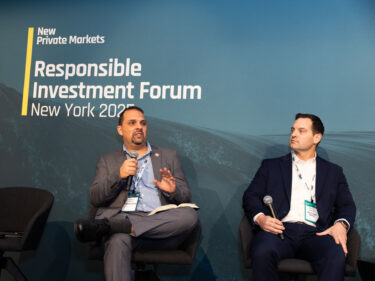
Table of Contents
- What is the PRI?
- The PRI Reporting Framework
- What's New in PRI Reporting?
- Private Equity Considerations
- Anthesis PRI Services
Share this article
The Principles for Responsible Investment (PRI) is the world’s leading proponent of responsible investment. Understanding and adhering to PRI reporting requirements is now essential for investment managers, asset owners and service providers aiming to align with global sustainability goals.
With the PRI reporting cycle opening in May 2025, early preparation is key to accurate and efficient reporting. For those just starting out, it’s crucial to allocate enough time to align internally, establish a dedicated reporting team, and gather the necessary data. For seasoned reporters, focusing on identifying and addressing gaps will ensure a robust submission that highlights year-on-year improvements and showcases your commitment to continuous ESG progress. Ahead of the 2025 reporting cycle, we provide an update on how General Partners can begin preparing their PRI submission.
What is the PRI?
The PRI is a well-established, United Nations-supported network of investors committed to sustainable investment practices. Founded in 2006, PRI helps signatories integrate ESG factors into their investment and ownership decisions. As of February 2025, there are 5,296 signatories, with investment managers making up approximately 76% of signatories.
What are the Principles?
Signatories commit to six voluntary principles:
- Incorporate ESG issues into investment analysis and decision-making.
- Be active owners and incorporate ESG issues into ownership policies and practices.
- Seek appropriate disclosure on ESG issues by investees.
- Promote acceptance and implementation of the Principles within the investment industry.
- Work together to enhance effectiveness in implementing the Principles.
- Report on activities and progress towards implementing the Principles.
These Principles guide investors toward practices that not only drive financial performance but also benefit the environment and society.
About the PRI Reporting Framework
The PRI Reporting Framework is designed to track signatories’ ESG integration progress, helping them benchmark against peers and demonstrate accountability. The 2025 Reporting Framework is closely aligned to that of 2024 and 2023, providing some continuity for a third consecutive year.
Who Must Report?
New signatories are given a grace period during which reporting is voluntary and responses can be kept private. After this, signatories are subject to mandatory reporting against their relevant modules on an annual basis.
Signatories that are part of the Net Zero Asset Managers initiative can report on their commitments to the PRI or the CDP (Carbon Disclosure Project).
Reporting Modules
The 2025 reporting framework includes the following modules:
- Senior Leadership Statement: Mandatory for all signatories.
- Other RI Reporting Obligations: Mandatory for signatories not in their grace period in 2025.
- Organisational Overview: Mandatory for all signatories.
- Policy, Governance and Strategy: Mandatory, but some indicators are voluntary.
- Manager Selection, Appointment and Monitoring: For signatories that outsource activities.
- Asset Class Modules: Only for investment management signatories in the relevant asset classes:
- Listed Equity
- Fixed Income
- Private Equity
- Infrastructure
- Real Estate
- Hedge Funds
- Sustainability Outcomes: Completely voluntary.
- Confidence Building Measures: Mandatory for all signatories.
Reporting Timelines: Preparing for the 2025 Reporting Cycle
As of February 2025, the PRI have now released the updated 2025 Reporting Framework which provides guidance on the reporting output ahead of the July 2025 deadline.
The 2025 reporting process follows this schedule:
- February: Release of updated Reporting Framework.
- May-July*: PRI signatories will have 12 weeks to report on RI activities and upload to the Reporting Tool.
- August-October: Data analysis, testing and generation of reports.
- November: Transparency Reports and Assessment Reports released.
*Exact dates will be confirmed by the PRI one month before the Reporting Tool opens.
What’s New in PRI Reporting
The PRI’s latest developments aim to streamline reporting and enhance the signatory experience.
The new, voluntary Progression Pathways initiative, set to launch in mid-2025, supports signatories in advancing their responsible investment practices. These pathways offer tailored guidance, resources, and benchmarks based on varying levels of ESG maturity and ambitions:
Progression Pathways
- Pathway A: Those seeking primarily to incorporate sustainability risks and opportunities.
- Pathway B: Those aiming to address drivers of sustainability-related financial risks.
- Pathway C: Those seeking a positive, real-world impact alongside financial goals.
Partial Reporting Option: Senior Leadership Statement and Other RI Reporting Obligations Module Requirements in 2025
Signatories that submitted a publicly available report in any previous year and met the minimum requirements will only be required to report on the ‘Senior Leadership Statement’ module and the ‘Other RI Reporting Obligations’ module. The remaining modules are voluntary for this group.
The ’Other RI Reporting Obligations’ module, new for 2025, allows signatories to disclose other responsible investment frameworks and regulations they report against, offering an opportunity to outline the extent of their reporting obligations. It consists of two indicators featuring tick boxes and short-answer fields.
These indicators:
- Give signatories an opportunity to share the extent of their reporting on responsible investment practices.
- Provide the PRI with a better understanding of current and future reporting demands on signatories.
- Collect data on international and regional reporting obligations to help the PRI develop and guide the future development of PRI reporting within the Progression Pathways model.
See the 2025 Indicator changes guide for a detailed breakdown of changes to indicators within all modules.
Reduced Reporting Effort
Alongside the partial reporting option, PRI has introduced new reporting efficiencies such as including a button to skip to incomplete indicators and text clarification boxes to help signatories provide additional information. The pre-filling will continue to be available for signatories who reported in 2023 or 2024, automatically populating 96% of indicators.
Key Considerations for Private Equity
The top 5 things we recommend Private Equity firms to consider ahead of the next reporting cycle:
- Review your previous submission to identify gaps and develop an improvement roadmap.
- Establish an internal reporting group to support your data collection process.
- Ensure portfolio companies are contacted early in the process to aid data collection efforts.
- Stay up to date with the latest PRI developments, including reporting modules tailored specifically to Private Equity.
- Due to the volume of signatories participating in the process, early submission to the PRI reporting portal is recommended.
Discover our Solutions for Private Equity
How Anthesis Can Help
Navigating PRI reporting can be complex, but Anthesis provides end-to-end support through services tailored to your organisation’s needs:
- PRI training: Online or in-person workshops explaining the PRI reporting process, modules, and data reporting best practices.
- PRI gap analysis: Conduct a gap analysis against the PRI scoring guidance and provide improvement recommendations.
- PRI submission preparation: Preparation and project management of the draft submission. Assistance with the final submission upload process.
- PRI uplift program: Use recommendations from the gap analysis to develop a pre-reporting cycle improvement program.
- Trusted advisor to guide you: By partnering with Anthesis, signatories can approach the 2025 PRI reporting cycle with confidence every step of the way.
Need support with your PRI reporting? Partner with Anthesis to strengthen your ESG credentials and navigate the reporting cycle with confidence. Contact us today to learn how we can guide you every step of the way toward responsible investment success.




